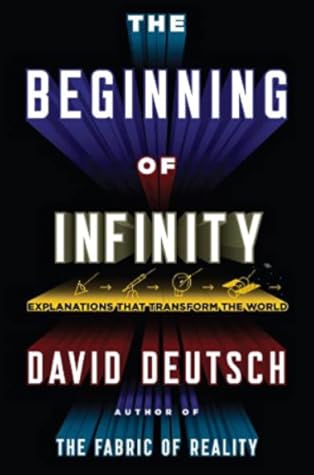More on this book
Community
Kindle Notes & Highlights
Read between
January 22 - April 20, 2017
In this book I argue that all progress, both theoretical and practical, has resulted from a single human activity: the quest for what I call good explanations.
Its neutrino radiation alone would kill a human at a range of billions of kilometres, even if that entire distance were filled with lead shielding.
Scientific theories are explanations: assertions about what is out there and how it behaves.
We do not begin with ‘white paper’ at birth, but with inborn expectations and intentions and an innate ability to improve upon them using thought and experience.
Discovering a new explanation is inherently an act of creativity.
Such ideas do not create themselves, nor can they be mechanically derived from anything: they have to be guessed – after which they can be criticized and tested.
The deceptiveness of the senses was always a problem for empiricism – and thereby, it seemed, for science.
the real key to science is that our explanatory theories – which include those interpretations – can be improved, through conjecture, criticism and testing.
empiricists came to believe that, in addition to rejecting ancient authority and tradition, scientists should suppress or ignore any new ideas they might have, except those that had been properly ‘derived’ from experience.
although scientific theories are not derived from experience, they can be tested by experience
That is relativism, the doctrine that statements in a given field cannot be objectively true or false: at most they can be judged so relative to some cultural or other arbitrary standard.
The essence of experimental testing is that there are at least two apparently viable theories known about the issue in question, making conflicting predictions that can be distinguished by the experiment.
I think that there is only one way to science – or to philosophy, for that matter: to meet a problem, to see its beauty and fall in love with it; to get married to it and to live with it happily, till death do ye part – unless you should meet another and even more fascinating problem or unless, indeed, you should obtain a solution. But even if you do obtain a solution, you may then discover, to your delight, the existence of a whole family of enchanting, though perhaps difficult, problem children… Realism and the Aim of Science (1983)


